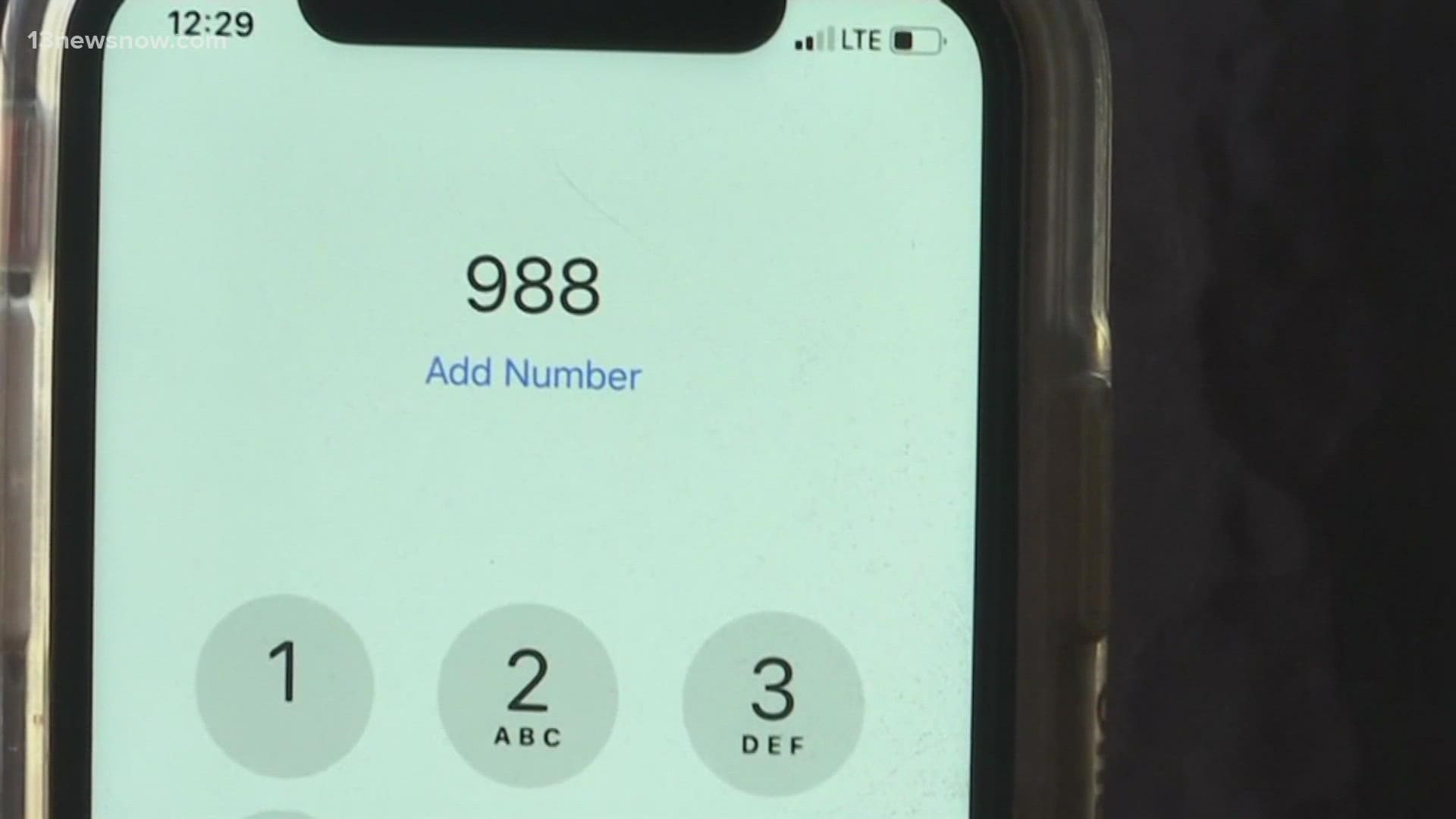VIRGINIA, USA — 988: That’s the new three-digit number for the National Suicide Prevention Hotline starting on July 16.
While 988 isn’t replacing local crisis center numbers, it’s simply an easy-to-remember resource to get you the help you need.
“It is going to revolutionize how people access mental health services. People aren’t going to have to memorize 20-million numbers. They’re going to know: if I’m having a bad day, I can call 988," said Staci Young, the Region 5 Crisis Call Center Administrator at Western Tidewater CSB.
The goal of 988 is similar to that of 911: to create a memorable number anyone in the country can call to get support during times of crisis.
Dennis Gillan, an international mental health speaker and the founder of the Half a Sorrow Foundation, said mental health is just as important as your physical health.
“It goes up and down. Same with my mental health. Some days it’s pretty darn good. Some days it ain’t so good. Let’s get cool talking about that because that’s life," Gillan said.
You also have the option to text 988, which according to Young, will make younger generations more comfortable reaching out for help.
"A lot of our youth are more comfortable texting than they are talking now," Young said.
The three-digit number is undoubtedly a huge step in crisis work. Nevertheless, it comes with its own set of issues.
According to Young, 988 is area code-routed, whereas 911 is geo-located. That means instead of using your current location to connect you to the closest crisis center, it uses the area code your phone is assigned to. This causes issues, especially for Hampton Roads because of our high tourist and Navy transplant populations.
“So, if you come here, and say you have a Pennsylvania area code and you dial 988, you’re getting routed to a Pennsylvania center,” Young said.
To combat this oversight, Young says Hampton Roads will continue to advertise the regional crisis hotline along with 988.
How's it funded?
In 2020, former President Donald Trump signed bipartisan legislation, National Suicide Hotline Designation Act, making 988 the new national suicide prevention hotline. The legislation left funding up to the states.
However, some states have struggled to find ways to allocate funds for this new hotline.
"What we have to do at a state level, all of us, is fund it properly because we're going to see an increase in calls," Gillan said.
According to a recent report from CNN, Virginia is one of four states that has state funding in place.
Former Virginia Gov. Ralph Northam signed Senate Bill 1302, which creates a "988 tax." The bill adds a surcharge on wireless phone plans to help pay for the crisis call centers, similar to the fee for 911. Prepaid wireless phones have an 8-cent surcharge, while postpaid wireless phones have a 12-cent surcharge.
Funding in Virginia will also come from the Dept. of Behavioral Health and Medicaid, according to Young.
What else is Virginia doing to combat the mental health crisis?
Since 2020, Virginia has undergone a total crisis system transformation. That’s when the Marcus Alert passed in the General Assembly, ensuring that behavioral health experts are involved in responding to individuals in crisis.
The law is named after Marcus-David Peters, a young, Black teacher who was killed by Richmond police during a mental health crisis.
"It was a lightning rod for attention to this issue," Gillan said. "When that happened, people said, 'That should never happen again.'"
Now, Marcus Alert systems are available in five localities across the state, including Virginia Beach.
While 988 is a national initiative, Virginia took it a step further, adopting a whole new system called the Crisis Now Model. This includes extra resources to combat mental crises at different points of entry, such as crisis hotlines, mobile dispatch teams, in-patient stays, and after-care services.
Moreover, the Western Tidewater CSB offers services that cater to groups with specific needs, such as veterans, LGBTQ, children, and more.
“I’ve been doing crisis work for about 20 years, and this is the first time I’ve really seen a systematic change in how we work with individuals in crisis," Young said.
The Crisis Now Model and 988 initiative will not only provide people with the support they need but will also lessen the burden on law enforcement agencies and emergency rooms that don't necessarily specialize in treating those in mental health crises.
Nevertheless, the work doesn't end here. Both Young and Gillan echoed the same sentiment: the U.S. is underfunded when it comes to mental health.
"The mental health system is dramatically underfunded," Young said. "Just like other public sectors, the mental health field is experiencing a staffing shortage, so we are still building capacity."
"This is one of those issues where Democrats and Republicans can agree that mental health is a priority," Gillan said. "Right now, every state needs a little more money for mental health. Period."
More resources:
Don't forget: starting July 16, anyone can connect to the National Suicide Prevention Hotline by simply dialing or texting 988.
But, other crisis hotlines will remain available:
- National Veteran's Crisis Line: 1-800-273-8255 and press 1
- National Suicide Prevention Lifeline: 1-800-273-8255 and press 2
- Region V (includes Hampton Roads) Crisis Call Center: 757-656-7755
For more information on mental health services at the Western Tidewater CSB, click here. For more information on suicide prevention, click here.

